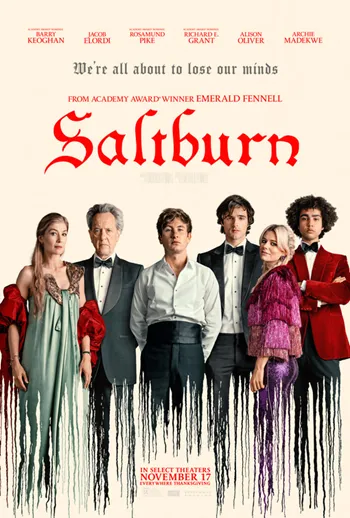
Emerald Fennell's “Saltburn” is a psychological-thriller sprinkled with intricate cinematography and grotesquely explicit sexual exchanges. Paired with the actors’ brilliant performances, the movie creates an experience that keeps the viewer glued to the screen throughout the 2-hour and 10-minute runtime.
The narrative follows Oliver Quick (Barry Keoghan), a financially struggling first-year scholar at Oxford, and his parasitic clasp on the dysfunctional Catton family. Although unable to fit in at first, Oliver quickly befriends Felix Catton (Jacob Elordi), the very embodiment of the popular rich kid cliché, and is invited to spend his summer at the Catton family’s esteemed manor, Saltburn, gaining entry into the world of the elitist British upper class. Following his arrival at Saltburn, Oliver sinks his fangs into the Catton family and slowly takes over.
Saltburn is home to Felix, his parents Elspeth and Sir James Catton (Rosamund Pike and Richard E. Grant), his only sibling Venetia Catton (Alison Oliver), and his cousin Farleigh (Archie Madekwe). We are introduced to the Cattons through the lens of a working class individual, highlighting the sheer difference in their lifestyles through the excessive formalities and interactions throughout the movie.
The movie is filled with events that make viewers gasp out loud from the story’s sheer absurdity, yet these scenes are elegantly shot to portray the characters’ raw emotions. There are definitely parts in the movie that the viewer can appreciate artistically, accompanied by an ending that leaves the audience dumbfounded.
However, from a more critical angle, the movie falls flat. Due to the setting and narrative itself, the movie inevitably becomes a social commentary on classism and its inherent evil. By failing to paint the Catton family as anything more than a rich family with distasteful jokes, the viewer is confronted by a conclusion where the significance of the narrative is lost. The Catton family lacks any political stance and is surprisingly welcoming to everyone. Even though they make shallow jokes, the Catton family as a whole lacks any antagonistic depth and isn’t accurately representative of the true evils of the elitist aristocrats. The narrative shifts from the fall of an elitist upper-class family to the fall of a not-so-nice family who happens to have a lot of money.
However, what really makes “Saltburn” a movie that lacks any meaningful impact in its narrative is their failure to utilize the character of Farleigh: Felix’s Black American cousin and the only person of color in the main cast. Farleigh, for many reasons, is the most intriguing and well-constructed character in the movie as well as my personal favorite. He comes from a financially insecure American family, which is why the Cattons decide to pay for his living expenses as well as his tuition at Oxford. He is similar to Oliver since they are both outsiders in the family at their core, and that’s exactly why Farleigh is the only character to truly see past Oliver’s deceitful nature. Farleigh, as the only person of color, is constantly alienated and reminded of the fragility of his position within the family. To fit in, he adapts and takes on the role of an upper class elitist. He’s a realistic depiction of how minorities, when part of an imbalanced power dynamic, end up undermining their own self-worth and changing their entire character to simply be associated with those in power because they have no other way to survive. It’s apparent that Farleigh is constantly clawing at the door just to associate with the Cattons, as he’s aware of his place within the family and has no option but to mold himself into the shape the Cattons desire. Farleigh is the epitome of self-preservation.
The movie tries to deliver a meta-narrative about racism within the upper echelons of society by utilizing Farleigh and his interactions with the Cattons. Even though the movie directly acknowledges this through Farleigh’s confrontation with Felix, where he points out that Felix doesn’t even know the names of the family’s Black footmen, their attempt at delving into this is shallow at best. Instead of building upon this, Felix says that he’s always seen Farleigh as ‘one of his own.’ After that point, the movie never really addresses racism, even if it is implicit in Farleigh’s interactions with other characters. The movie eventually draws comparisons between Farleigh and Oliver to signify their equal status as outsiders. Although I did think these comparisons added to the depth of complexity within the family and the movie, it certainly should not have been prioritized over—or in this case entirely replace—the meta-narrative about racism. It takes away from the essence of Farleigh’s role in the movie and the significance of the movie’s narrative.
In conclusion, “Saltburn” is a piece of media that tries to do too many things, therefore failing at a lot of them. There were definitely parts where I thought the movie was genuinely intriguing, but the overarching plot and the way everything unfolds left me disappointed and wanting more. I also think that by utilizing characters like Farleigh in a more impactful way, the movie could have been better. However, the actors’ performance and beautiful visuals made for a very unique and aesthetic film that can be enjoyed by viewers through the artistic expression of the cast.
